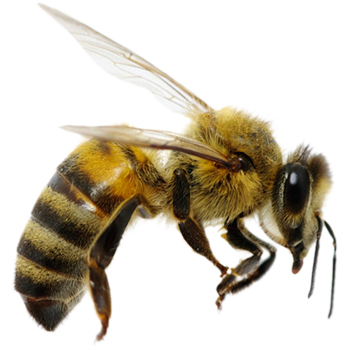Pest Control for Bees: What You Need to Know and When to Hire an Exterminator

Viking Pest does NOT treat nor exterminate Honey bees. Honey bees are important pollinators and are an integral part of our environment. If you do not know what type of bee you see around your home, call Viking Pest, and while on the phone, a certified, trained representative will help you determine if it is a bee or another pest.
Bees are insects that are simultaneously beloved and loathed. Bees are often used as a metaphor for hard work and community living, and some species produce delicious honey as the fruit of their labor. However, for people who fear stings or are allergic, any interaction with a bee can be terrifying. Bees are also dying at unprecedented rates, which leaves us vulnerable as one-third of the crops grown within the U.S. are reliant on bees for pollination. If bees become a pest in or around your home or business in New Jersey, Maryland, Delaware, or Pennsylvania, it’s important to call an expert bee pest control company, like Viking Pest. These professionals can deal with bees properly and ensure neither bees nor humans are harmed. To protect your home or business from bees, you need to learn about the behavior of this pest, take steps for prevention, and find effective treatment options should an infestation occur.
What Are Bees?
Bees are small insects with six legs and two pairs of wings. Most of the time, we picture bees as striped yellow and black with hairy bodies, but there are plenty of bee species that look quite different. The leaf-cutting bee (Megachile spp.) and mason bee (Osmia spp.) are two examples of bees that range in color from metallic green to black with silver stripes.
Pest control experts at Viking Pest explain every species of bee builds its own nest and most species help pollinate different plants. The bees that we know from large, honey-producing communal bee colonies are honey bees. There are hundreds of unique bee species found in Maryland, Delaware, New Jersey, and Pennsylvania.
How Do I Identify Bees?
Bees are often confused with other similarly shaped stinging insects like wasps and hornets. However, the most common bees found in New Jersey, Maryland, Delaware, and Pennsylvania all have wide, barrel-shaped bodies that look fuzzy or hairy. Typically, bees in this region are found around flowers and plants and aren’t to aggressive toward humans. Bees just want to be left alone.
Some species of bees, like honey bees, build large nests in communal hives, and all live together. These bees are easy to spot because of the distinct honeycomb structure and the large number flying around. Other types of bees build nests in tunnels or holes in the ground, while carpenter bees lay their eggs in gouged-out wood, explain local exterminators at Viking Pest.
How Do I Get Bees?
If you’re a gardener, having lots of bees flying around your flowers and plants is a good thing. However, if they’re gathering in overwhelming numbers, it may be time to call in a bee pest control expert. Although bees feed on nectar from various plants, they’re attracted to human food and gather around unattended sugary drinks, food, or food waste.
Pest control experts at Viking Pest explain honey bees most frequently nest in man-made hives or in natural areas like hollow trees. However, if their hive gets too crowded, some bees may split off in search of another area where they can build a nest. Sometimes, these swarms build nests in homes or gather around other human-inhabited buildings. A large number of bees in these swarms seems frightening, but they pose no danger to humans.
What Are the Effects of Bees in and Around My Home or Business?
These swarms of bees are intimidating because of the sheer number of bees present. Pest control experts at Viking Pest explain there can be more than 10,000 bees in one swarm, and they can gather in clumps as large as a basketball. Although these swarms are harmless and generally disperse in a day or so, it’s off-putting to have these bees around your home or business.
On rare occasions, bees may build permanent nests in your home, office building, or outdoor space. If there are cracks or holes in your exterior, you may find bees nesting in your attic or roof explain local exterminators at Viking Pest. If that’s the case, it’s a good idea to call a specialist in pest control for bees. Special care must be taken with bees nest pest control, to ensure that no harm comes to these helpful pollinators.
How Long Do Bees Live?
Every species of bees has a similar life cycle, beginning with an egg. Viking Pest’s certified entomologist, Craig, explains the egg then grows into larva and eventually undergoes pupation to metamorphose into a fully grown, winged insect. On average, a bee’s life span ranges between a few weeks and a few months.
Honey bees are a little different; their life span depends on their function. Worker bees can literally work themselves to death within three weeks in the summer months, while a queen bee can live for two to five years. Male drones, whose only purpose is to mate with the queen, expire after mating.
How Do I Prevent Bees?
The best way to prevent bees is to clean up food or drinks that have been left outdoors. Make sure the lid of your garbage can is securely closed. It’s also wise to clear your lawn and garden of clutter that bees could use as a location for a nest.
To ensure no bees enter your home or place business to nest, pest control experts at Viking Pest recommend sealing, and caulking all cracks and holes in your exterior. If you’ve had issues with bees nesting in your building or home in the past, make sure all remnants of them are gone. The previous bee residents may have left behind pheromones or small pieces of honeycomb that are attracting new swarms.
If you spot a swarm of bees or a hive being constructed in and around your home or business in Maryland, Pennsylvania, New Jersey, or Delaware, it’s important to leave the bees nest pest control to the experts. Honey bees are generally docile unless you attack their home or threaten their queen. In New Jersey, specifically, it’s actually illegal to exterminate honey bees, because they’re a protected species. To ensure their proper and humane removal, call in pest control experts at Viking Pest.















